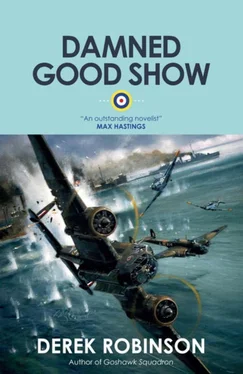Yet 409 was kept on stand-by. Nobody was fighting, everybody was getting cheesed off. Something had to be done. The Wingco made Pilot Officer Silk the squadron entertainments officer.
“I don’t care what you do as long as you brighten them up,” Hunt said. “Give ’em something to look forward to, something to talk about except bloody Poland.”
“Yes, sir. Is money available?”
“Within reason.” The Wingco hunched his shoulders. “What’s that stuffed up your left sleeve?”
“My handkerchief, sir.”
“Silk, isn’t it? Some sort of clever-clever trademark, I suppose. I don’t like it. Makes you look like a ponce. I don’t suppose I can stop you poncing around the station, but at least you’ll do it properly dressed, without bits of haberdashery hanging off you. And listen, Silk.”
“Sir?”
“Entertainment does not include pornographic cabaret acts with naked dancers and reptiles. Understand?”
“That was Langham, sir, not me.”
“Don’t argue. Get cracking. If I see you standing still I’ll know you haven’t got enough to do.”
Silk went in search of Tony Langham and found him soaking in a bath so hot the steam rushed out of the door. Langham had just landed after a four-hour patrol over the North Sea. “Fucking ice all over the kite,” he said. “Fucking squall line. Bounced about like a rubber fucking ball. Took her up to fifteen thousand. Fucking heating system failed. Instrument panel froze fucking solid. Icicles in the fucking oxygen tubes. Turned for home, got shot at by the Royal fucking Navy, so naturally my observer gave me the wrong fucking course, we made landfall at Berwick-upon-fucking-Tweed, and now I think I’ve got frostbite in the goolies.”
“Just another day in the office, then.” Silk sat on the bath stool. “What color are they?”
Langham submerged his head and blew bubbles, and came up. “One’s green and one’s blue,” he said.
“That’s pleurisy. My aunt died of it. Look here, the Wingco’s made me Entertainments Officer. What shall we do?”
“Hold a dance, of course. Best way to keep the troops happy is let them get their hands on female flesh.”
“We haven’t got a band.”
“You’re bloody useless, Silko. Get me a phone, I’ll get you a dozen dance bands, all assorted colors. Where’s your initiative?”
“My wicked stepfather cut it off when I was seven.”
“Chuck me a towel.” Langham stood up. “The trouble with your family was the wrong father got shot.”
Silk nodded. He admired Langham for his candor, his readiness to think the unthinkable and speak the unspeakable. Very UnEnglish. Very refreshing. Langham was right, of course; Silk had often wished his stepfather dead and his real father alive instead. Completely irrational, he knew that. Especially when the stepfather was rich.
“If he hadn’t paid my fees at Clifton,” Silk pointed out, “you and I would never have met.”
“Yeah. The old bastard’s done his good deed, it’s time he went.”
“A bit hard on my mother.”
“No, it’s not. What do you care, anyway?”
Right again.
Silk’s real father had been shot dead in an ambush in County Cork. This was back in the Twenties, after the Irish Free State was set up. There was a civil war of a peculiarly Irish kind, tangled and merciless. What in God’s name was ex-Captain Silk, previously of the 2 ndRoyal Dublin Fusiliers, doing down there? Making money, somehow. That was all his wife knew. She was in England with a four-year-old boy and, after the funeral, precious little money.
She remarried fast. The market was alive with young war widows; it was no time to be seeking Prince Charming. She accepted a widower, Beresford Cronin QC, fifty-one, specializing in patent law. Later he became a judge. At the age of ten, young Silk got taken to watch his stepfather in court. Counsel spoke at a slow dictation speed and Judge Cronin wrote down every word, using an ordinary steel-nib pen, which scratched and scratched. Silk thought the law was worse than school.
On the other hand, school was better than the gray, passionless respectability of home, especially when the boy was old enough to be sent away to Clifton College.
At first the place scared him. It was too big, too hearty, and he didn’t understand the unwritten rules, so he hung back, took no risks, and was ignored. He wasn’t unpopular; just ignored. Tony Langham was in the same year, and Silk envied him because he was good-looking, athletic, free-spending and popular; but Silk was too nervous to speak to him. Most of the time, Silk felt both ravenous for friendship and incapable of it. One day, halfway through his second year, he was sprawled on the grass in a gloomy corner of the school grounds, chewing a thumb, brooding, his eyes damp with tears, when Tony Langham walked up and said: “Can you give me five shillings?”
Silk shook his head.
Langham poked him with his boot. “Why not?”
Silk shook his head again. Langham poked him harder. “Speak up, dummy.” Silk turned away. Langham said, “If you won’t speak up, you can cough up. Five bob.” Another prod.
A rush of rage overcame self-pity. Silk jumped up and punched Langham just below the breast-bone. Langham crumpled and sat, too badly winded to speak. Silk was astonished, then afraid, then—as Langham slowly revived—proud of his strength.
Langham wheezed and spat. “Bloody hell,” he whispered. Threads of saliva fell from his lips.
“You started it.” Silk was beginning to regret that punch. It would have been nice to have had Langham as a friend. Now he was an enemy.
“Half a crown would do,” Langham said, still wheezing.
“What’s it for?”
“Buy an airplane.”
Silk laughed. The more he looked at Langham, the funnier he was. Langham couldn’t laugh but he grinned a bit. In the end they went off together and contrived a letter to Silk’s mother, all about a broken fountain-pen and imminent exams. A postal order for ten shillings came back. They bought a model kit of an SE5a and spent the change on ice-cream sundaes.
Building the plane took three weeks. The SE5a was one of the best fighters flown by the Royal Flying Corps, a single-seat biplane with a machine gun fitted on the upper wing so that its fire would clear the propeller arc. The kit was ambitious. The frames and stringers for the fuselage, the ribs and spars for the wings, every part of the tail unit, had to be cut from sheets of balsa. Bits broke. Silk and Langham argued over the meaning of the plans. They cut their fingers; ran out of glue; assembled items wrongly and had to start again. But when the fighter was finished—doped, painted, gleaming—its making had built a bond between them. For the first time in his life, Silk felt worthwhile.
On a day when the rest of the school was watching a cricket match, they sneaked out with the SE5a. There was a perfect place to fly it nearby: the Downs, a mile or more of parkland. “Here?” Silk said, but Langham was carrying the model and he kept saying there was a better place further on.
After fifteen minutes he stopped at the edge of the Downs, where the Avon Gorge fell sheer for a couple of hundred feet. “This is a fat lot of good,” Silk said. He had to look over the wall, it was irresistible, and his guts clenched at the depth of this huge, airy canyon, with seabirds wheeling far below. “Watch!” Langham called. As Silk turned, Langham launched the plane into space.
The image stayed with Silk for the rest of his life: that splendid little fighter, bright in the sunlight, whirring away into the terrible void, sometimes bucking as the breeze caught it but always sailing the air, as balanced as a bird. He watched every dip and turn the SE5a made until it crashed into an old quarry face a quarter of a mile away. When he looked around, Langham was watching him with a small, crooked smile.
Читать дальше












